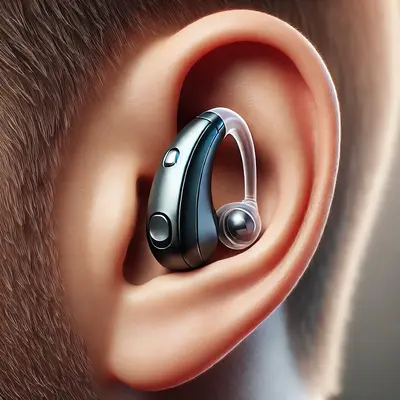Hearing aid technology has experienced significant advancements over the past decade, but with the integration of artificial intelligence (AI), we’re now witnessing a complete revolution in how these devices improve the lives of people with hearing loss. No longer are hearing aids just simple amplifiers of sound; today, they can analyze, adapt, and learn in real-time, bringing a world of enhanced communication to users.
Personalized Sound Experience with AI-Powered Hearing Aids
Imagine Jane, a 57-year-old teacher, who struggled for years with traditional hearing aids. While they helped amplify sounds, they often failed in noisy environments, like crowded classrooms. But when Jane switched to AI-enhanced hearing aids, everything changed. Now, her device adjusts to her surroundings automatically, suppressing background noise while prioritizing the voices of her students.
AI-driven hearing aids do more than just amplify. They intelligently learn from the user’s environment, identifying patterns in sound, such as recurring voices or noise sources. This makes personalization easier and much more accurate, leading to an optimized hearing experience, no matter where the user is.
In fact, Dr. Emma Smith, a leading audiologist, notes: “With AI, hearing aids can automatically detect and suppress background noise in challenging environments, offering a far superior auditory experience compared to older models.” This improvement is a game-changer for users like Jane who deal with complex audio settings every day.
Enhanced Speech Recognition with Machine Learning
For someone like Roberto, a 62-year-old retiree who loves social gatherings, clarity of speech is essential. AI-powered hearing aids use machine learning algorithms to improve speech recognition in noisy environments. This technology has a profound impact on users’ ability to communicate effectively.
AI algorithms are trained to recognize speech patterns and distinguish between various sound frequencies. They can prioritize human voices over background sounds such as wind, street noise, or chatter. Roberto’s new hearing aids allowed him to enjoy dinner parties again, as they adapted to the surrounding noise and focused on amplifying only the voices of the people near him.
Real-Time Sound Adaptation and AI Learning
The ability of AI to continuously learn from the user’s environment makes these hearing aids particularly unique. Instead of manually adjusting settings, AI-powered hearing aids automatically adapt to changing conditions. For example, Olivia, a teacher, uses AI-enhanced hearing aids that adjust dynamically when she switches from performing on stage to listening lessons in her quiet home. The device understands these shifts and adapts the sound output accordingly.
Table: Key Features of AI-Powered Hearing Aids
| Feature | Benefit |
|---|---|
| Noise Suppression | Reduces background noise, focusing on speech clarity |
| Adaptive Learning | Automatically adjusts to different environments |
| Enhanced Speech Recognition | Prioritizes human voices over non-speech sounds |
| Real-Time Feedback | Learns and improves based on user feedback and preferences |
| Connectivity | Syncs with smartphones for app-based control |
Cognitive Health and AI Integration
One unexpected benefit of AI in hearing aids is its potential link to cognitive health. Research suggests that untreated hearing loss can contribute to cognitive decline over time. Dr. Benjamin Cooper, a neurology specialist, explains: “When patients have access to AI-enhanced hearing aids, their brains work less hard to understand sounds. This reduces cognitive load, which could potentially slow down cognitive decline associated with hearing loss.”
This improvement in hearing aids isn’t just about sound quality. It’s about improving overall quality of life and possibly even contributing to long-term cognitive health.
AI-Assisted Tinnitus Management
Another critical innovation is AI’s role in managing tinnitus, a condition characterized by persistent ringing in the ears. The use of AI has led to breakthroughs in tinnitus treatment, where hearing aids can generate sounds that mask the ringing, providing relief. Emily, a 45-year-old office manager, used to lose sleep because of her tinnitus, but her AI-enhanced hearing aids now provide soothing background noise tailored to her specific needs, significantly improving her sleep and daily productivity.
AI algorithms can be customized based on user feedback, making them highly effective for managing unique cases of tinnitus. According to Dr. Sarah Thompson: “AI-powered tinnitus management is one of the most exciting areas of hearing aid development, offering personalized relief options that were previously unimaginable.”
Future of AI in Hearing Aid Technology
Looking ahead, the future of AI in hearing aids is promising. As machine learning algorithms continue to improve, hearing aids will become even more precise, intuitive, and user-friendly. Features like real-time language translation and augmented reality integration are already being researched, showing how far this technology can go.
AI is not only changing the way we hear but also how we interact with the world around us. And for millions of users like Jane, Roberto, and Olivia, these advancements are not just technological improvements – they are life-changing.









